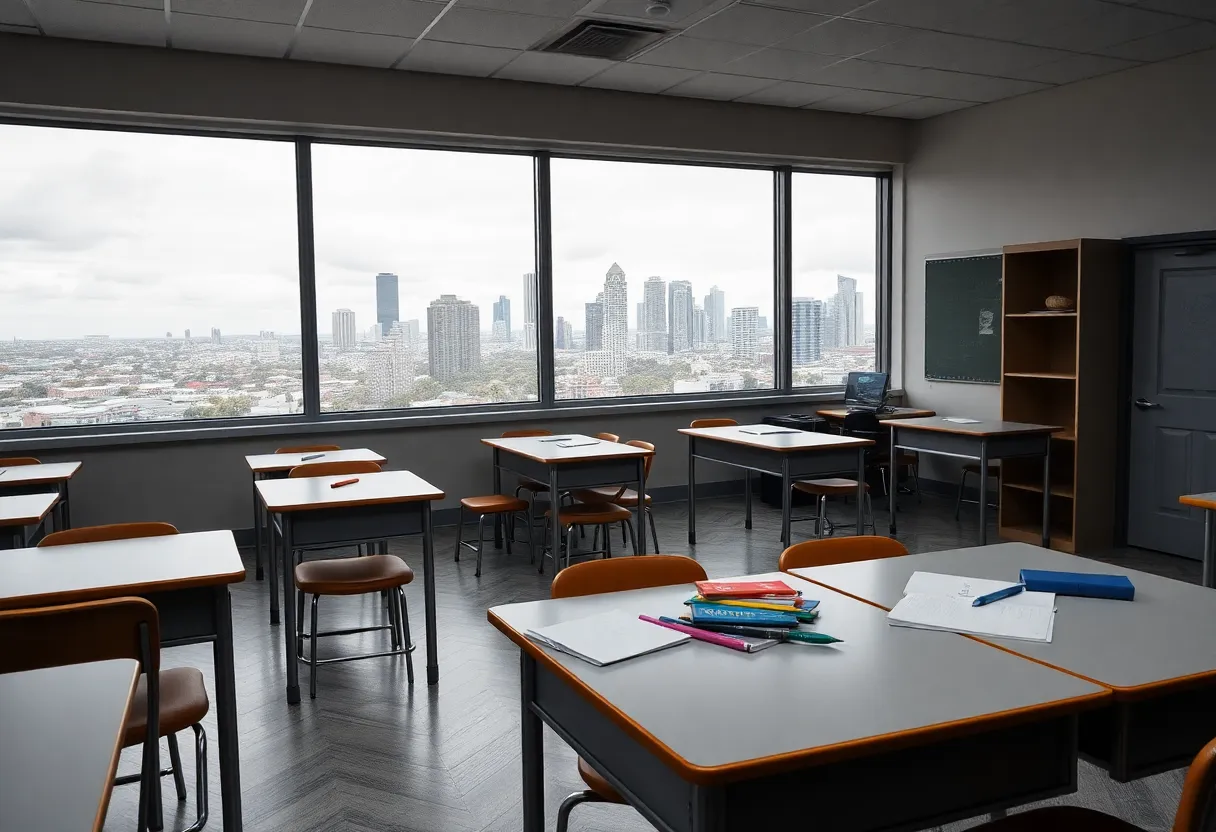News Summary
As the anniversary of Hurricane Katrina approaches, its effects on New Orleans’ education system remain significant. The mass firing of teachers and state takeover of schools in 2005 transformed the landscape, leading to a predominance of charter schools. While some argue the new system has improved outcomes, critics highlight a decline in Black educators and the impact on Black students’ academic performance, emphasizing ongoing challenges in the community’s education framework.
New Orleans – As the 20th anniversary of Hurricane Katrina approaches, the effects of the catastrophic storm on the education landscape of New Orleans remain profound. In the aftermath of the storm in 2005, over 7,500 public school employees, including many veteran teachers, were laid off. This mass firing, alongside the state takeover of public schools, marked a significant shift in the city’s educational framework that has left lingering impacts on the community and the teaching profession.
Jackie Brown-Cockerham, a former teacher at Alcée Fortier High School, was among those who lost their jobs during the upheaval. Billie Dolce, a special education teacher, recalled preparing for the school year just before the hurricane struck. However, like many others, she found herself without a job shortly after, with no students to teach in the wake of the storm’s devastation that closed schools and forced students and educators to scatter.
In both immediate and long-term responses to Hurricane Katrina, the Orleans Parish School Board terminated a significant portion of its teaching staff, which shifted control of public education to the state of Louisiana. This transition led to the establishment of the nation’s first all-charter school system, eliminating traditional attendance zones. Consequently, students began attending schools in neighborhoods far removed from their own, reshaping the educational experience across the city.
The charter school movement was largely justified by the poor performance and financial difficulties of many of the schools prior to the hurricane. While supporters argue that the new system has yielded improvements, such as higher test scores and increased college admission rates, these changes have been met with pushback from previous educators and community members. Critics claim that the mass firings have destabilized the Black middle class in New Orleans and diminished the teaching profession’s representation for Black educators. Before the storm, over 70% of public school teachers in New Orleans identified as Black. By 2014, this figure had plummeted to 49%, with numbers not returning to pre-Katrina levels.
This shift not only affected the demographic makeup of educators in the city but also impacted the academic performance of Black students, who statistically achieve better outcomes when taught by teachers of the same race. The absence of seasoned Black educators has weakened the local education system, leading to decreased accountability within Black neighborhoods, and altering the community fabric that supported students and families.
In efforts to address the fallout, the American Federation of Teachers sought to re-establish the teachers’ union post-Katrina, but many educators remained hesitant to return amid the shifting dynamics. Many of the new hires lacked the deep-rooted community ties that the pre-Katrina teaching workforce had fostered, leading to a disconnect between teachers and their students.
Years of lawsuits followed for many educators attempting to reclaim their positions and seek financial reparations. While some rulings favored the teachers, higher courts did not uphold these decisions, adding frustration to an already challenging landscape.
As leaders within the New Orleans community engage in discussions surrounding educational reform, initiatives such as Black Education for New Orleans (Be Nola) emerge. These programs aim to retain and support Black educators while striving to improve educational outcomes for Black students, addressing the challenges that have persisted since the hurricane.
Looking toward 2025, the upcoming anniversary of Hurricane Katrina serves not only as a reminder of the destruction but as a pivotal moment for reflection on the ongoing challenges and opportunities that continue to shape New Orleans’ education system and its residents.
Deeper Dive: News & Info About This Topic
HERE Resources
New Orleans Halts Tax Collection Fees for OPSB
New Harmony High Integrates AI into Curriculum in New Orleans
Compliance Issues Persist in New Orleans Independent Living Facilities
New Orleans Marks 20th Anniversary of Hurricane Katrina
University of New Orleans Transitions Back to LSU System
Students Make History by Proving Pythagorean Theorem
Community Leader Harold Alton Pesses Passes Away
New Orleans Man Arrested for Deadly Avondale Shooting
New Orleans Police Seek Help for Missing Teen Marchelle Frith
Louisiana Officials Alarmed by Proposed FEMA Cuts
Additional Resources
- The Guardian
- La Illuminator
- ABC News
- Black Enterprise
- NOLA
- Wikipedia: Hurricane Katrina
- Google Search: Hurricane Katrina education
- Google Scholar: Hurricane Katrina impact on schools
- Encyclopedia Britannica: Hurricane Katrina
- Google News: Hurricane Katrina education New Orleans
Author: STAFF HERE NEWORLEANS WRITER
The NEW ORLEANS STAFF WRITER represents the experienced team at HERENewOrleans.com, your go-to source for actionable local news and information in New Orleans, Orleans Parish, and beyond. Specializing in "news you can use," we cover essential topics like product reviews for personal and business needs, local business directories, politics, real estate trends, neighborhood insights, and state news affecting the area—with deep expertise drawn from years of dedicated reporting and strong community input, including local press releases and business updates. We deliver top reporting on high-value events such as French Quarter Festival, New Orleans Jazz & Heritage Festival, and Essence Music Festival. Our coverage extends to key organizations like the New Orleans Chamber of Commerce and Greater New Orleans, Inc., plus leading businesses in energy, healthcare, and education that power the local economy such as Entergy, Ochsner Health, and Tulane University. As part of the broader HERE network, including HEREShreveport.com, we provide comprehensive, credible insights into Louisiana's dynamic landscape.

